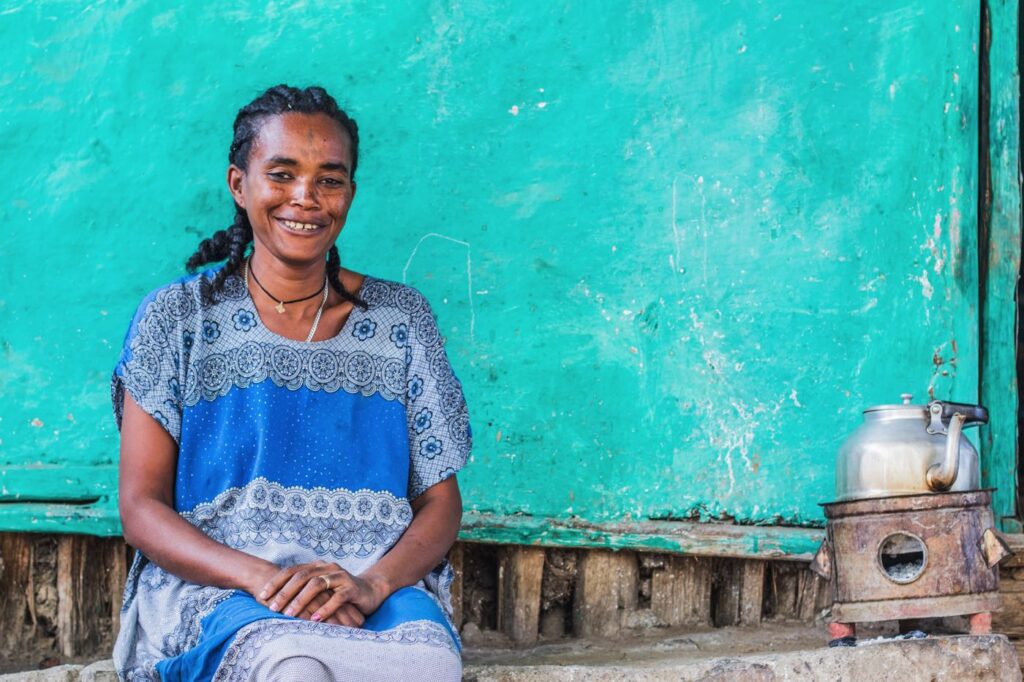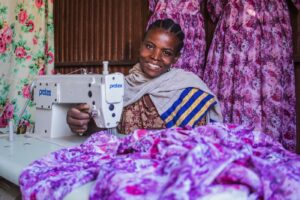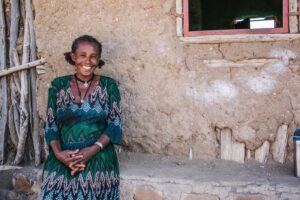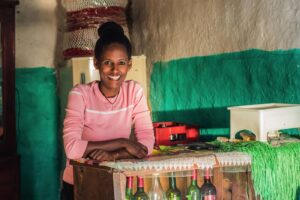Mulunesh ‘Naniye’ Tsegaye is a proud owner of a cafe in East Belesa woreda, and her establishment is growing in popularity. The cafe, which she launched in 2017, is part of the income generation scheme she thought of at a community meeting organized by CARE. The meeting was organized by SWEEP, a project implemented by CARE through the financial support of the Austrian Development Agency, which aimed to increase household access to clean water in East and West Belesa and use water resources as an entry point to engage with and empower women.
Before opening up her own cafe, Naniye relied on farming. “Farming was challenging. The land is dry and not very conducive for good crop production. On top of that, water was painfully scarce. We didn’t have enough to drink let alone to water the land,” she says, remembering a time when she would travel nearly four hours on foot to find pond water. Naniye, along with her husband who does seasonal labor work and her 3-year-old daughter, suffered because of poor crop production. The family would skip meals at times to make sure they had enough to last for the next day.
When Naniye attended meetings held by CARE, she learned of the culture of savings, and she was thrilled when CARE organized them into village savings and loan associations (VSLA) to begin saving. The first VSLA group she joined was composed of 22 women and each one contributed ETB 30 each month. Though saving was new to Naniye and she felt anxious about putting money away, the conversations on income generation had lit a fire inside of her. She knew she had to take risks for the cafe she knew she wanted to open.
Meanwhile, CARE, through SWEEP, had also constructed water supply posts much closer to Naniye and her farmland creating easy access to clean water. Soon after, Naniye took out a ETB 2,000 loan against the pool of savings from her VSLA group which amounts to nearly ETB 45,000, and she used the funds to buy onion seedlings. The production was fruitful, she made a profit of a little over ETB 2,000 after settling her loan. She used the profit to launch her cafe with simple offerings like tea and coffee. When the crop regenerated the next season, she made a profit of ETB 7,000. She used the earnings to expand her offerings at the cafe, adding meals and even liquor to her menu.
“More than the water supply, and even more than the money we now earn, I am most pleased with the change in perspective for the community. Our meetings have changed the lives of women in East Belesa! I am sure every woman will be telling her children and grand-children about what CARE has done for her,” exclaims Naniye, referring to the Social Analysis and Action (SAA) meetings by SWEEP which create space for community dialogue on social practices and norms. Through SAA, the community has been able to correct some of its deep-seated harmful practices and social norms including that of the marginalization of women.
Where there used to be non-existent participation from women in informal decision making spaces in East Belesa, because of the change in perspective, Naniye now sits as the secretary to her VSLA and coordinator for her SAA group. “What a sense of community it has created for us! We save together, and we discuss life together! Women can finally speak their minds, and that has been tremendously beneficial not just for women but also men in the area,” says Naniye, who now shares household chores and responsibilities equally with her husband.
Naniye’s cafe is growing in popularity because of her diligence which she says comes from her ambition. “Imagine this, I used to skip meals so we could have enough to eat the next day. Now, not only are we comfortable in life, but we have savings for a bad day. My daughter can go to school when she’s old enough,” reflects Naniye, whose sense of entrepreneurship has made her an exemplary citizen in East Belesa. This speaks to the success of SWEEP’s overarching objective which is to improve the food security and resiliency of chronically food insecure households in the intervention woredas.
Naniye’s story is not a one-off success story, but has come to embody the drastic change in trajectory of the lives of women in Belesa since SWEEP interventions. Morale has been boosted, and whereas income generation used to be seen as an act of desperation, it is now seen as admirable entrepreneurship. Naniye, like many other women in Belesa, does not plan to stop here. She dreams of growing her restaurant into a small arcade, adding a billiard’s table and dart boards. When her daughter is old enough, she longs to send her to school where she can get educated.






